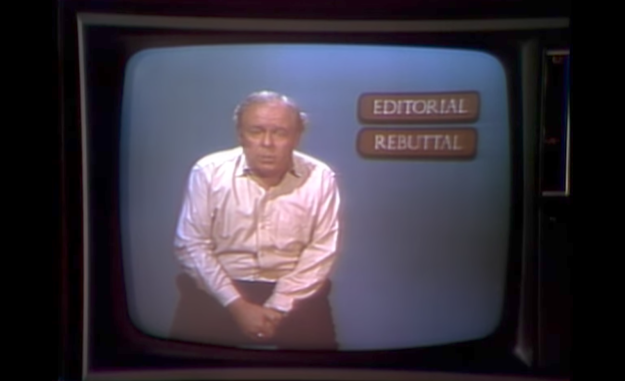
All in the Family, “Archie and the Editorial” (1972)
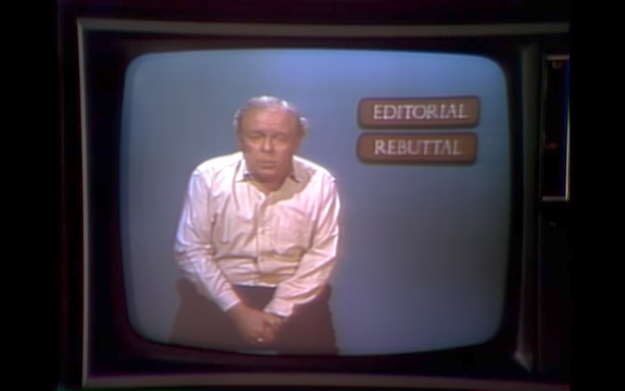
Tandem Productions
Archie Bunker (Carroll O’Connor) goes on television to condemn gun control, then he’s later robbed at gunpoint.
“I encourage writers to deal with what’s on their minds, pay attention to what’s going on in your culture, your home, your neighborhood, your country and don’t be afraid to write about that.
“Gun control has been an issue ever since I was old enough and sensible enough and sane enough to know it was an issue. It’s so engrained in our culture and we people who lean left have not really made the case that needs to be made for what the Second Amendment really means. The Second Amendment doesn’t endorse people’s right to have attack guns. People may have guns if they belong to militias or they’re protecting their towns or are policemen or whatever. The Second Amendment doesn’t say they can have attack guns, but it’s been used and misused … we shouldn’t be selling attack guns. We shouldn’t be selling weapons of mass destruction to anyone who wants one.”
—Norman Lear, creator
Beverly Hills, 90210, “The Next Fifty Years” (1991)
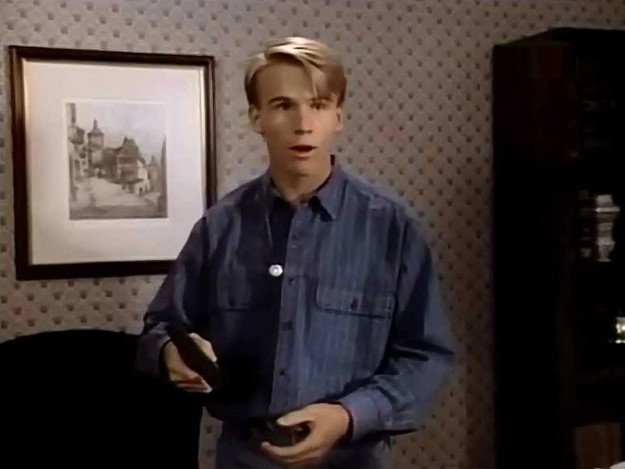
90210 Productions
Scott Scanlon (Douglas Emerson) accidentally kills himself in front of David Silver (Brian Austin Green) after finding his father’s gun.
“As early as June 1991, Beverly Hills, 90210 was no longer ‘the little show that could,’ but a full-fledged ‘teen demographic hit,’ which would go on to generate a 75% share with teenage girls, 12-17.
“We didn’t build those kind of numbers solely because of Jason [Priestly] and Luke [Perry]’s sideburns, or because of our glitzy [Aaron] Spelling imprimatur, but because of our commitment to bring issue-oriented social drama into the mix. To this end, I distinctly remember hearing about a 17-year-old who had been accidentally shot and killed in a hotel near Disneyland on grad night on the morning I was supposed to inform Doug Emerson, the actor who played freshman nerd Scott Scanlon, that we were not picking up his option for Season 2. But instead of kicking him to the curb, I asked if he would come back as a recurring character for a few episodes in which, after returning from a summer spent with his grandparents in Oklahoma, his best boyhood friend — West Beverly D.J., David Silver — would effectively shun him (and his ubiquitous cowboy hat) now that he started hanging out at The Peach Pit with the popular kids.
“Interesting enough, it was the only time I can remember that Fox executives came to Mr. Spelling’s office to team up with my boss in an effort to talk me out of doing the culminating episode, ‘The First 50 Years,’ in which Scott accidentally shoots himself with his father’s gun in front of David at an excruciating, cringeworthy birthday party after Steve [Sanders], Kelly [Taylor], and the others left for hipper pastures. Thankfully, the powers that be backed off once they sensed my passion and understood my motivation — which was nothing short of changing the gun laws in America, and our political culture in the process. By the following year, Bill Clinton became our president (with overwhelming support from young women voters between 18-24 who watched our show). Two years after that, the Assault Weapon Ban became law. A good time was had by all.”
—Charles Rosin, co-writer and executive producer
My So-Called Life, “Guns and Gossip” (1994)
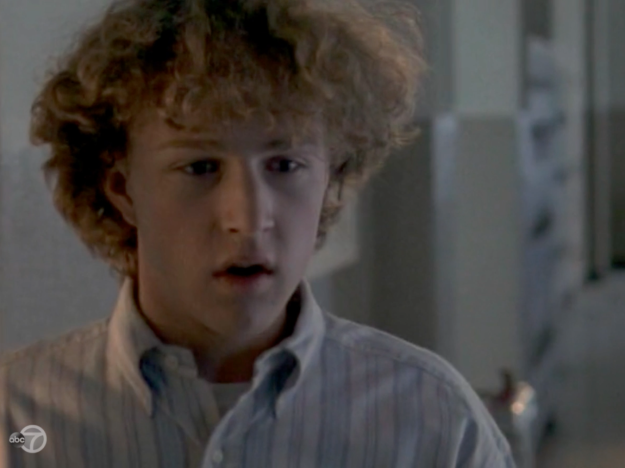
The Bedford Falls Company
A gun goes off in school and Brian Krakow (Devon Gummersall) is pressured to reveal who it belongs to.
“We were writing stories about teenagers, and felt a responsibility to explore, as best we could, some of the complex issues affecting the lives of young Americans. We felt we owed that to our audience.
“Back then, I could never have imagined how much worse things would get.
“But the numbers of the dead pile up, year in, year out… We shake our heads, intone the words ‘thoughts and prayers’ and act like there’s nothing we can do.
“Don’t we owe our children more than that? Is there nothing we can do about the ease with which people in this country can acquire automatic weapons? Where are all the ‘pro life’ people? Oh right. That only applies to fetuses. Do we really want our children to inherit a country where it’s harder and harder for a woman to control her own body and destiny, and easier and easier for someone to turn a joyful gathering into a mass grave?
“Prayer is vital, yes. But we can’t just pray.
“God helps those who help themselves. And to quote AA’s serenity prayer, what we desperately need now is ‘courage… to change the things we can.'”
—Winnie Holzman, creator
Law & Order, “Gunshow” (1999)
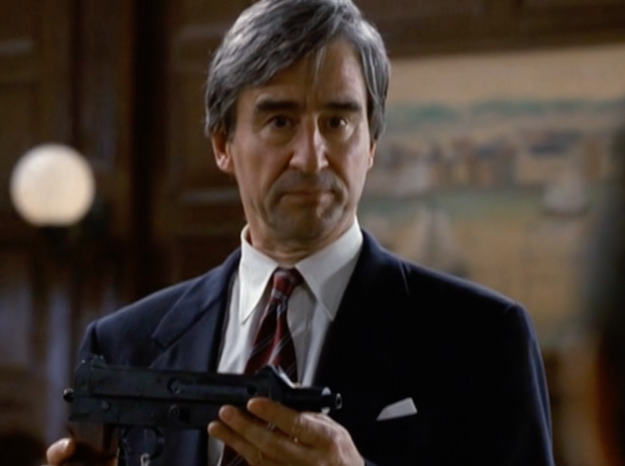
NBC Universal
Following a mass shooting in Central Park, Jack McCoy goes after the gun manufacturer for knowingly selling a design that could more easily be converted to an automatic weapon.
“I wrote ‘Gunshow’ in 1999 because I wanted to call out the gun profiteers who marketed easily-modified (wink-wink) semi-automatic assault weapons to the public and then hid behind the Second Amendment when these weapons were modified to full automatic and used in mass killings. In real life, nothing has been done in the years since to regulate and hold accountable those businesses that make and sell easily modified semi-automatic weapons. And so, tragically, almost 20 years later, the Las Vegas shooter was able to modify his arsenal of ‘legal’ semi-automatic weapons to full auto.
“Myself, I’ve got nothing against guns per se. I’ve got nothing against hunting — I spent many a chill morning in a duck blind with my dad. And I’ve got nothing against responsible people buying a gun to protect their home and family. But back in 1999, I wanted to make the point that reasonable people can disagree about the Second Amendment. Most Americans would agree that the Second Amendment is not a blank check. Freedom of movement is another right enshrined in the Constitution and yet everyone agrees that you need a driver’s license to get around, that you can’t drive a tank or a Formula One car on the freeway. Reasonable and strictly enforced local and federal gun laws, along with a national database, could put a dent in the body count. But we know all that. Just like we know that most of what the NRA and the gun lobby say is fear-mongering crap. They are in it for the money. For all the good the NRA does promoting gun safety, they completely undermine that mission by lobbying and intimidating politicians into a catatonic state whenever gun laws come up for debate. Does the NRA and its fellow merchants of mayhem really care about the Second Amendment? Only in so far as it allows them to make money off the gun business. Their support of our Constitutional rights is selective — they support the broadest reading of the Second Amendment at the expense of our inalienable rights to life and the pursuit of happiness.
“The NRA has successfully defended the unfettered right of companies portrayed in ‘Gunshow’ and of gun owners to make and purchase easily modified semi-automatic weapons. The NRA’s arrogant rallying cry is ‘I’ll give you my gun when you pry it from my cold, dead hands.’ This past weekend, thanks to the NRA’s lobbying efforts, a madman was able to pry the life from the cold dead hands of dozens of innocents in Las Vegas.”
—Rene Balcer, writer and executive producer
Degrassi: The Next Generation, “Time Stands Still” (2004)
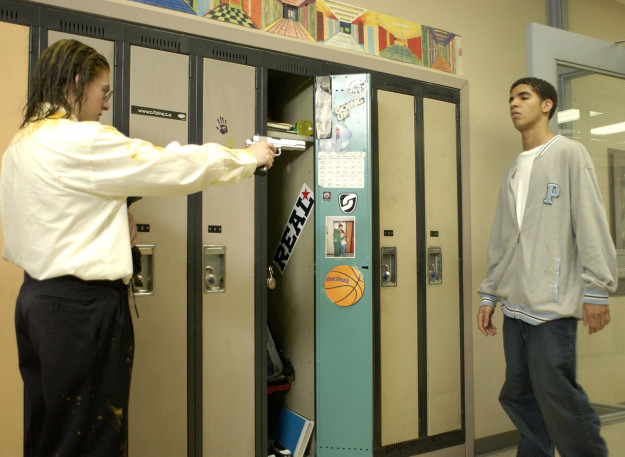
Bell Broadcast
After Rick Murray (Ephraim Ellis) is humiliated in front of his classmates, he attempts to get revenge by bringing a gun to school, where he shoots — and paralyzes — Jimmy Brooks (Aubrey Graham aka Drake).
“We started developing Degrassi: The Next Generation a year or so after the Columbine school shootings. Back in 2000, mass casualty shootings (like the one at Columbine, and a tragic list of other schools) were still a relative anomaly. Columbine was horrifying, and it stuck with me, the writing team, and Linda Schuyler and Stephen Stohn, because the shooters were teenagers.
“Canada, of course, has had our own share of horrific mass shooting deaths, the most shocking happening when I was in high school. In 1989, 14 female students at Montreal’s École Polytechnique were gunned down by a deranged man full of hatred towards women. Canada is not immune to gun violence. No country is.
“In Degrassi, Rick Murray was always a character with problems, particularly around his anger, and his fragile ego. These manifested in his controlling, abusive relationship with his girlfriend, Terri MacGregor, which we explored in Season 3 – and then everything came to a head in Season 4, when other Degrassi students pulled a prank on Rick, humiliating him live on TV, and he decided to get his revenge.
“It was important to us (and Brendon Yorke, who wrote the two teleplays) that we present Rick as both a perpetrator, and a victim. Rick was violent, and the victim of violence. When pushed to the edge, Rick decided to get revenge in a terrible way. Ease of access (Rick goes home and grabs his late father’s unsecured handgun), plus mental instability, led to Rick returning to the halls of Degrassi with the intent to ‘get back’ at those he perceived had done him harm, only to target the two characters (Jimmy Brooks and Emma Nelson) who were actually on his side.
“We wanted to explore why. Why do teenagers do such terrible things? And how. How does a teen get his hands on a gun and bring it to school? How does no one see the warning signs? How does no one act on the warning signs? Or choose to turn a blind eye? How does someone as young and intelligent as Rick sink so deeply into his own anger, and hatred, that he decides to kill?
“When a tragedy occurs, like in Las Vegas, gun rights advocates cry, ‘People kill, not guns.’ Yes. People do. But they kill because they can access guns. In the fictional world of Degrassi: The Next Generation, Rick Murray shot Jimmy Brooks and then himself because, while consumed by a blinding vengeance, he was able to get his hands on a gun.”
—Aaron Martin, co-writer and executive producer
One Tree Hill, “With Tired Eyes, Tired Minds, Tired Souls, We Slept” (2006)
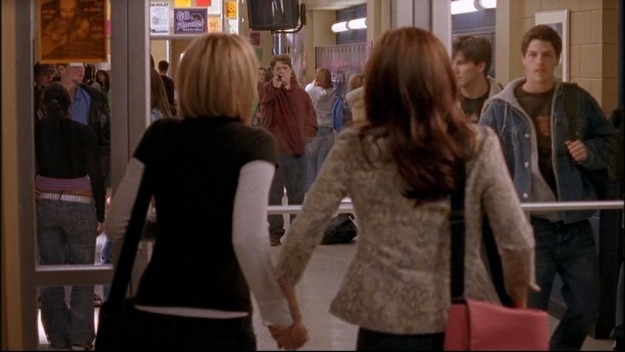
Warner Bros.
Years of bullying lead Jimmy Edwards (Colin Fickes) to bring a gun to school.
“To be honest, I simply wanted to do a story about kindness — about being kind and gracious and tolerant at a time in life when a week feels like a year and a month feels like forever. At the time that I conceived of the episode, the Columbine High School tragedy was the most significant recent tragedy and people used to whisper when they would refer to it. I didn’t want to whisper. I wanted to talk about it loudly and remind kids that their time in high school amounted to about 700 days, all in — ask them to believe that it gets better and urge them to look past their struggles, even though those struggles are real.
“I wanted to ask the pretty and popular and well-balanced and well-adjusted young people to use their powers for good and not ill. There weren’t a lot of anti-bullying campaigns that I can recall at the time. What I do recall is how frightened Hollywood was when I first suggested the episode. How concerned the executives were that the episode would somehow encourage violence rather than discourage it. I remember one of them said ‘God forbid a kid walk into a school with a handgun after this episode airs,’ and I replied, ‘That’s already happening and it’s going to keep happening. We should talk about it.’ For me, the episode’s not about gun violence as much as it’s about violence. Full stop. And kindness. And a broken kid who couldn’t see past his very real and very immediate pain.
“I once wrote a script for a television series that was quiet and charming and heartfelt and kind. Two studio executives called me at home and said they normally send e-mails about scripts they read, but they wanted to personally call to tell me that it was one of the most beautiful scripts they’ve ever read. (It was based on a book, so the author gets more credit for that than I do.) Then they said, ‘Unfortunately, we’re not sure we’re in that kind of business.’ If television and the stories we tell can truly make a difference, if Hollywood can actually influence someone sitting in the dark somewhere who is struggling with real world problems, shouldn’t we be in that kind of business? That’s what I was chasing when I wrote ‘With Tired Minds…’ I simply wanted to remind young people that kindness matters. It did when I was young, and it always will.”
—Mark Schwahn, creator
Hit Record on TV, “Regarding Guns” (2015)
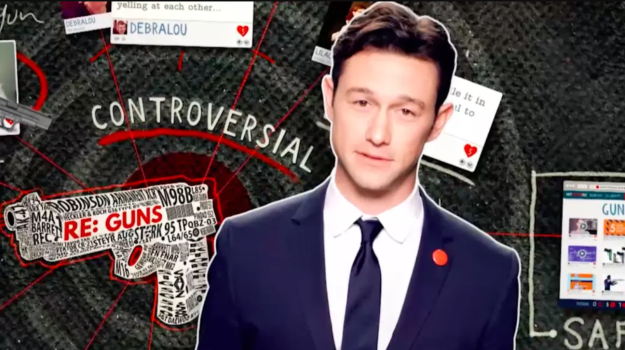
hitRECord
Less than one month after Dylann Roof killed nine people at the Emanuel African Methodist Episcopal Church in Charleston, South Carolina, Joseph Gordon-Levitt’s crowdsourced series used facts, animation, music, and Zac Efron to talk about guns.
“The word ‘culture’ — unless it comes after ‘pop’ — is sort of looked down on as snooty. And to try to address something really serious with music and with drama and with comedy, some would consider insensitive because generally, if you look at TV, none of it’s there to address real life issues. It’s there to offer viewers an escape, a distraction, a bit of entertainment. And there’s nothing wrong with that — I totally enjoy a popcorn movie — but I think there’s also a place for talking about real life stuff because I really think that communication is a big part of the issue.
“A song or a piece of comedy that makes some people laugh could start a conversation and that conversation can be productive. It won’t be productive if it’s just people yelling at one another, and that was a concern of some people on the site: Conversations about guns never lead anywhere productive, it just leads to people yelling at each other. And there’s truth to that if you look at the current conversation about guns; or anything people feel strongly about. Often times it’s like people approach conversations with their minds already made up and with a certain amount of prejudice, so I really wanted to do it and I wanted to do it in such a way that avoided that prejudice.”
—Joseph Gordon-Levitt, creator
Degrassi: Next Class, “#SorryNotSorry” (2016)
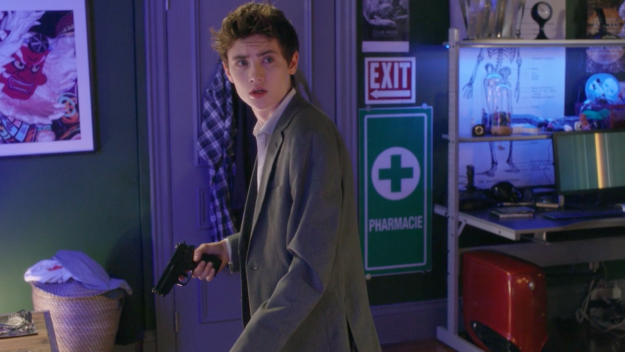
Netflix
The newest Degrassi series once again discussed gun violence in an episode that has Hunter Hollingsworth (Spencer Macpherson) secretly bring a gun to school.
“Gun control in and of itself is not a major issue in Canada, since guns are in fact controlled here. So when we have told important and moving stories about bullying or mental illness that have involved guns, our main theme has not been whether guns or gun control are good or bad, but rather how guns can unfortunately and sometimes tragically exacerbate situations.
“When Hunter brought a gun to school in the ‘#SorryNotSorry’ episode, it was an act of both desperation and mental illness — he was talked down by his brother and in later episodes, received much needed therapy.
“In the ‘Time Stands Still’ episode, Jimmy ended up being an innocent victim and spending the rest of his student life in a wheelchair, shot by Rick — who was both a bully and being bullied — and who himself died in the struggle. For that episode we researched heavily with Barbara Coloroso, who wrote a book on the Colombine tragedy, showing how bullying can create a toxic environment, where it is sometimes difficult to tell who are the bullies, who are the bullied, and who are the not-so-innocent bystanders who have turned a blind eye to what is going on.”
—Linda Schuyler and Stephen Stohn, creators

